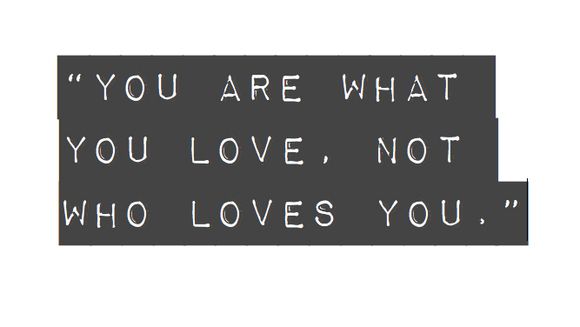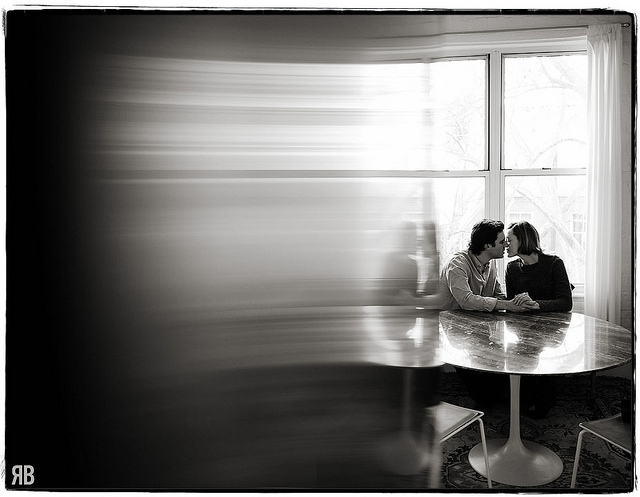There is an ebb and flow of closeness in relationships. The amount of emotional connection and distance fluctuates. I first noticed this with a crush I had on someone years ago. I remember feeling anxious when our normally quite deep and personal conversations changed for a week or two into more casual surface interactions. There was always a return to depth and connection for us, but I feared there wouldn’t be. At some point, I was able to extricate myself from my hazy love mind and get objective. I noticed the back and forth pattern and told myself to calm the heck down. I think that is when I began developing myself so that I would not need someone else’s attention to make me feel OK. It was scary to need someone’s validation that much. Out of survival mode, personal curiosity and a later-learned lesson that people who have their own light are more attractive and content, I started differentiating myself.
I am still working on it.
How secure is your relationship today?
We have a constant monitoring system which looks over our relationships and judges how secure they are.
Even within the relationships I have with my children I experience frustration, fear, love and safety. There are times when they seem closer to their dad than me. During those phases, I feel I have lost touch with them. This is hard to take. My ego squawks and I feel alone and unsure of my parenting. Other times, I desperately desire space from them in order to internally recharge which leaves me feeling bad for wanting the distance. Still other times, our family life hums along. I nurture my kids in a way that feels right to me and I know the kids appreciate each parent for their own ways and style.
An inability to handle the changes in closeness can wreak havoc on any relationship. We can feel distanced and dependent if we allow ourselves to be swept away by the tide of changes.
The trick, according to marriage counselor and author of Passionate Marriage, Dr. David Schnarch, is to develop the ability to manage your emotions and reactions to these fluctuations. He suggests doing this by undergoing the process of differentiation.
Separate together
Differentiation entails maintaining personal integrity while maintaining a connected relationship or more simply, holding on to yourself while holding on to someone else.
How do you do that?
According to family counselor, Nancy Eisenman, you start with an openness to learning from experiences, then move to a readiness to act/change/grow. This means significant self-awareness followed by actual self-regulation.
Self- Awareness: Know your shadow side — the parts of you you’d like to hide, the darker imperfect side. Know your wounds — childhood slights and suffering, past relationship baggage you still carry. Notice them, own them and feel them. Do the same with the glowing facets of yourself. Take down walls, be vulnerable, be authentic but also maintain boundaries so you are directed from within rather than moved to please others. Be aware of your immediate reactions to others. Self-awareness is most easily found by taking time to go internal and reflect. Therapy, meditation, practicing craftsmanship, writing, running, praying, feedback from trusted individuals — this is an incomplete list of gateways to increased self-knowledge.
 If you know who you are then no one else can tell you who you ought to be.
If you know who you are then no one else can tell you who you ought to be.
Freedom.
Take heart, self-awareness is a lifelong process.
Self- Regulation:Taking responsibility for your own reactions and anxiety. Acting counter-intuitively. Stop your defensiveness and knee-jerk reactions which arise from your past hurts (childhood, former relationships). Permission to pause. Revolt against The Myth of Urgency, which is the belief that you have to react right away when someone is pushing your buttons. Nancy Eisenman, MSW, LSW, urges her clients to think, I can be just fine in this moment without reacting immediately. In fact, the ability to hold still in the moment will allow you to later react with thoughtfulness and calmness.
If you can manage your own anxiety, it is easier to be with others and their anxiety. Their reactivity is theirs, and not about you. You will have a level of objectivity and patience that allows for greater intimacy with that person.
An important note to keep in mind while you are working on yourself and making changes — The system (i.e. the relationships, way of doing things) you had in place before beginning the differentiation process is going to rebel against the new less- reactive you. The system does not like changes therefore it will require time, integrity and courage to stay the new course and allow the parts of the old system you value, to adapt, while the parts you do not value, fall away.
Rather than reacting to your or your partner’s needs for closeness or separation do this…
At times, it feels as though our stability depends on another’s caring and opinion of us. We need them to make us feel loved and valuable. Other times, too much togetherness makes us uncomfortable and we need space.
It is easy to react with a plea for solitude during the highly intimate times and with insecurity during the more distant times but the most healing and evolved way to enhance a relationship is to help each participant differentiate. When an individual is solid in their feelings about themselves they can tolerate fluctuations in relationship closeness and therefore relax into intimacy.
Do you think it is easier for introverts or extroverts to differentiate? How enmeshed are you within your relationships? How do you handle when someone is too close or too distant within a relationship?








[…] like this can only be avoided for so long, then they have to be handled. As I mentioned in, How to Handle the Fluctuations in Emotional Security and Closeness Within a Relationship, working through gridlock involves the process of differentiation. Differentiation means […]
[…] is his own person. He is immune to my anxieties. Miraculously, his personal integrity and strength, fortify me. Normally, I am so […]
Please change my email address to carolvcowan@gmail.com. I want to keep getting your valuable and informative correspondence.
Thank you. Carol
Dear Carol,
If you would like to keep receiving my posts simply re-subscribe with your new email address.:) Glad to have you as a reader.
I really needed this right now. My happiness level is in direct proportion to how much positive attention and validation I get from others. I’m dating someone new, and we email every day. If I don’t get the email on time, I feel rejected and want to withdraw. It’s nutty and painful.
That roller coaster IS nutty and painful. Being dependent on someone else to make your day is a lot of pressure on them and an easy way to make yourself high-anxiety. I know. I have done that. I honestly think we all have. I posted an image on the space2live Facebook page that said, Don’t wait for the right person to come into your life. Make yourself the right person to walk into someone else’s life. I think that speaks to the process of differentiation. You are aware of your reactivity. That is the first step. Now go forward and define your personal integrity so that you can be intimate with someone without being dependent on or highly reactive to them. Best of luck! Thank you for reading and sharing so openly.